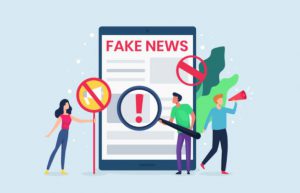Social media nowadays is full of misinformation & fake news and surprisingly our maximum number of the population reads, believes, digests, and relies on fake messages and posts they read or watch on WhatsApp, Facebook, and YouTube. To end the whole confusion, Google has shared 5 tips to ascertain the difference between fake and real news on International Fact-Checking day which falls on April 2. Read on to know about the tips.
Before jumping to the tips lets under What Is Fake News?
There are two kinds of fake news:
- Stories that aren’t true. These are entirely invented stories designed to make people believe something false, to buy a certain product, or to visit a certain website.
- Stories that have some truth, but aren’t 100 percent accurate. For example, a journalist quotes only part of what a politician says, giving a false impression of their meaning. Again, this can be deliberate, to convince readers of a certain viewpoint, or it can be the result of an innocent mistake. Either way, it quickly attracts an audience and can become entrenched as an “urban myth.”
What Could Be The Source Of The fake News?
Fake News isn’t a new term for us we hear the rumors about celebs, health issues, and even global issues on daily basis and the major source of this is SOCIAL MEDIA. Social media platforms allow almost everyone to publish their thoughts or share stories with their followers. The concern is, most people don’t even check the source of the information before they share it, which can lead to fake news spreading quickly or even “going viral.”
Word of mouth( an offline source of Fake news), as we all know this is one of the most dangerous things in the world. It can either turn things constructively or may destroy a relationship entirely.
For instance, Co-workers who gossip by the water cooler or cafeteria don’t usually check the facts before sharing it which ultimately leads to the spreading of misinformation, even if involuntarily.
Six Ways to Spot Fake News

– Find out more about the source: Google notes that users can find out more about the source of an article or website by clicking on three dots on the right of an article, given that the source checks itself out. This tool is available only in the US as of now.
— Check if an image is authentic: There are multiple pictures that are forwarded on WhatsApp and Facebook that are not genuine or tend to mislead people. Google notes that users can check if an image is authentic by right-clicking on a photo and selecting “Search Google for Image.” Mobile users can do the same by touching and holding the image for some time. Google will then check if the image has appeared online before and the context in which it appeared.
— Look for more than one source: Google notes that users can check for the full coverage of a news piece if they switch to news mode or search for a topic in Google News. Users can click on full coverage to see the news outlets that have covered the news.
— Use Google’s fact-checker: Google users can type in a keyword and look for claims made by news publication and fact checks listed by Google. Users who wish to look for an elaborate fact check search for a topic in the Fact Check Explorer, which according to Google collects more than 100,000 fact checks from reputable publishers around the world.
— Confirm if an event is taking place in the said location: Google notes that users can confirm if an event is indeed taking place at a location by checking Google Earth or the Street View of a location on Google Maps.
Tips source: India Today
Featured Image Source: BBC News

